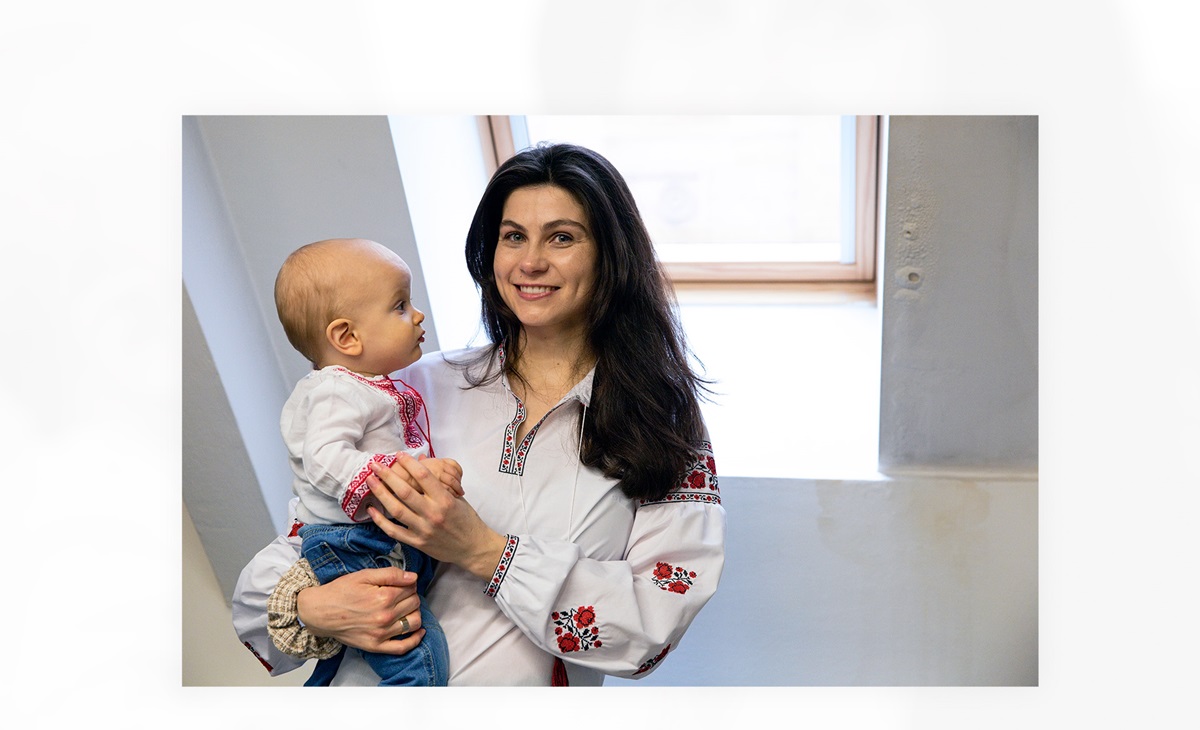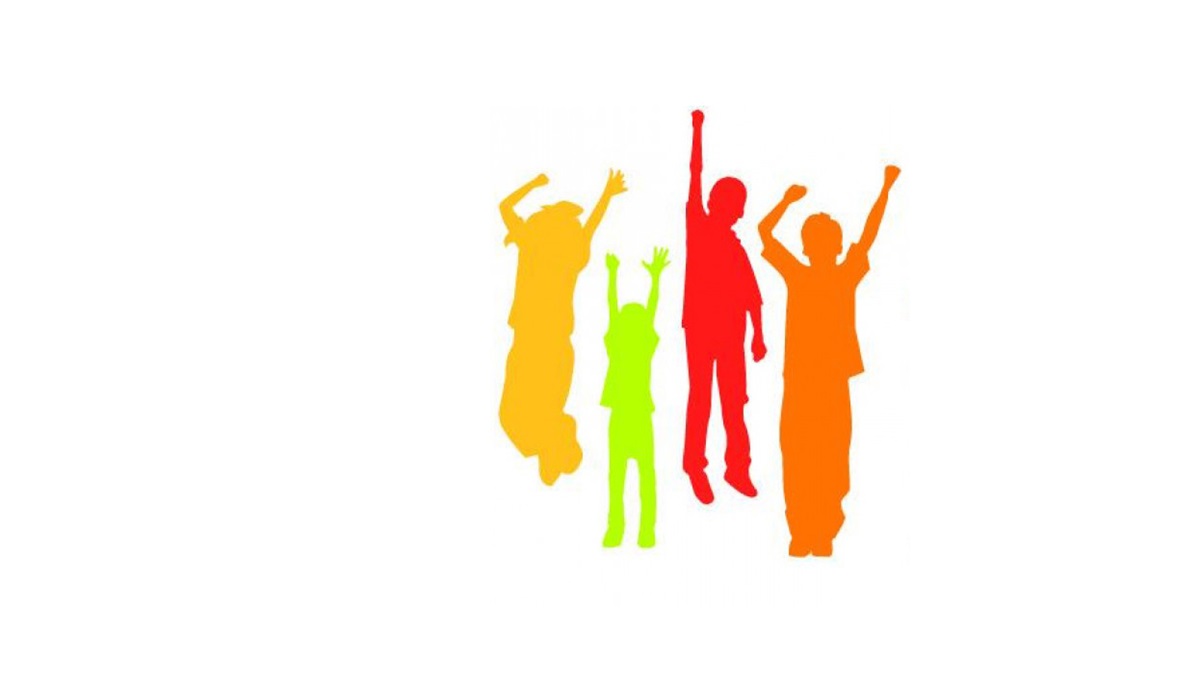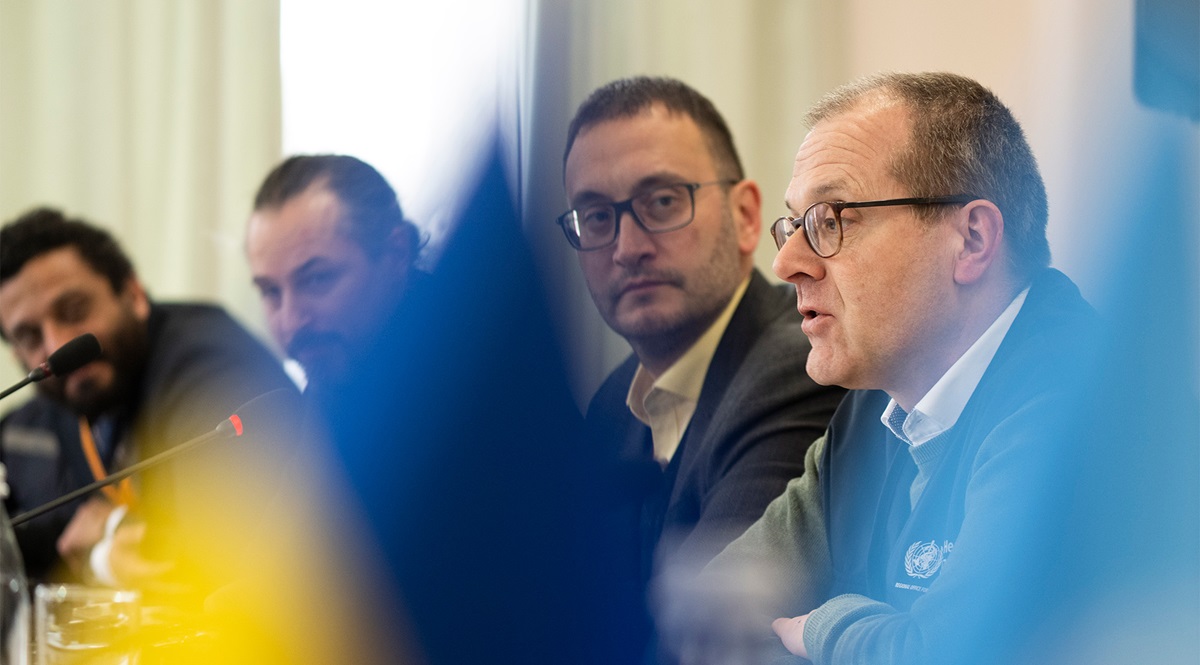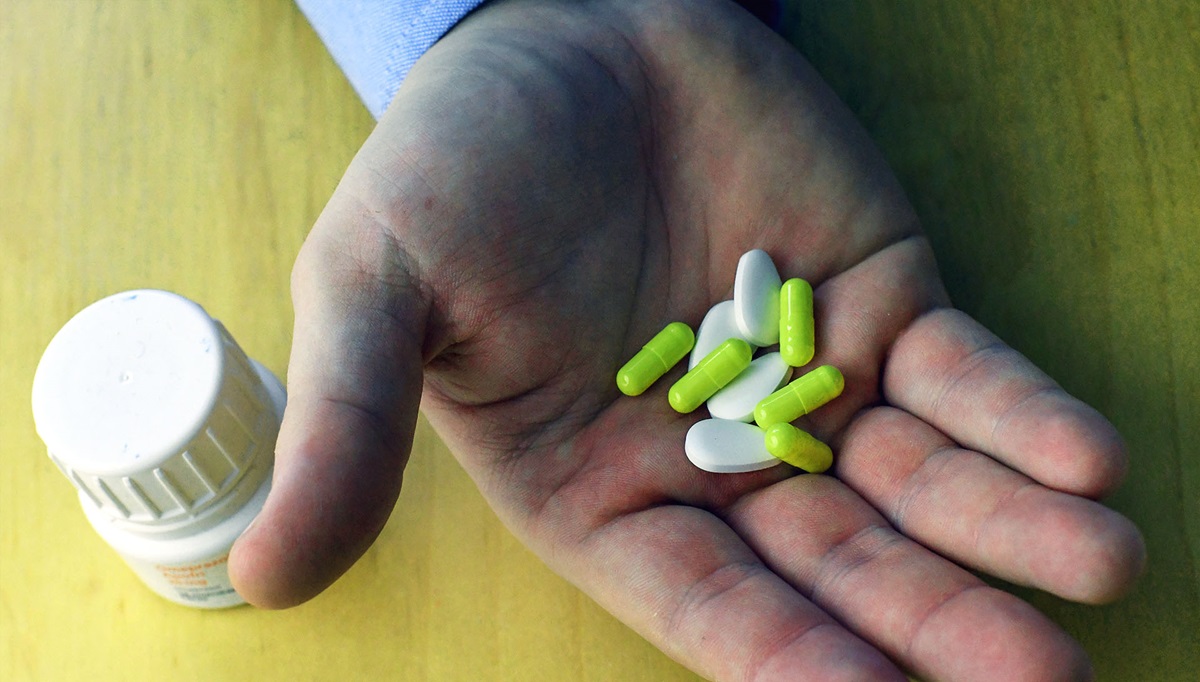No images? Click here
“Focusing on my baby gave me the strength to cope with the reality of my situation”
24-02-2023
Since the start of the Ukraine war, the Czech Republic has sheltered around 500,000 people, of whom 476,000 remain in the country. Julia is one of over 200 Ukrainian mothers who have delivered babies at a maternity hospital in Prague. She talks about her experiences since the war started in February 2022.29-year-old Julia Melnyk lives in Prague with her baby son, Sviatoslav. The happy, healthy baby gurgles in her arms and she looks adoringly at him. But the circumstances of her first year of motherhood have been completely different to what she had envisaged when Julia and her husband found out they were going to be parents in September 2021. That all changed when war broke out on the 24 February. In that moment, we immediately knew that this was war, this was serious. In that moment there was no longer any certainty that our lives were safe, neither mine, my husband nor the life of our baby. I also knew that there was no certainty that I would be able to receive adequate medical care to deliver my baby... Read full story
European Immunization Week 2023
23 – 29 April 2023
The WHO European Region celebrates European Immunization Week (EIW) to raise awareness of the importance of immunization in preventing diseases and protecting life. This year’s campaign will work to improve vaccine uptake in the context of a global backslide in vaccination rates due to the COVID-19 pandemic.
TÜRKIYE AND SYRIA EARTHQUAKES
WHO Director-General's opening remarks at the media briefing – 22 February 2023
22-02-2023
Emergency Medical Teams supporting the health response to the Türkiye earthquakes
17-02-2023
Statement – Türkiye/Syria earthquakes
14-02-2023
UKRAINE EMERGENCY
Using data to provide more specialized health care in Ukraine
01-03-2023
The WHO Country Office in Ukraine, in collaboration with national and regional health authorities, is using data collection and monitoring tools to assess health-care resources and service availability to inform critical health-care interventions in areas impacted by the war. The Health Resources and Services Availability Monitoring System (HeRAMS) involves gathering information on the functionality of health facilities, damages incurred, basic amenities and service availability across various domains, including trauma and general services, child health and nutrition, communicable diseases, sexual and reproductive health, maternal and newborn care, noncommunicable diseases, and mental health and psychosocial support.
More than 100 000 people reached with key health interventions at Ukraine’s frontlines
31-01-2023
The crucial role of cultural mediators in Romania's Ukrainian refugee response
23-02-2023
Helping Ukrainian refugees adjust to life in Romania – Nataliia's story
23-02-2023
Ukrainian refugees granted mental health and psychosocial support in Republic of Moldova
22-02-2023
Moving forward as a Ukrainian refugee in Moldova – Tetiana's story
22-02-2023
Svetlana's story – “There’s nothing for me to go back to now”
21-02-2023
MPOX (MONKEYPOX) OUTBREAK
COVID-19
New study helps inform actions to increase COVID-19 vaccine uptake among Albania’s health workers
06-03-2023
COVID-19’s unequal impact in Kazakhstan: examining the divide between urban and rural children
27-02-2023
WHO and Government of United States of America deliver medical oxygen systems to Ukrainian hospitals
13-02-2023
Increasing Recognition, Research and Rehabilitation for Post COVID-19 Condition (long COVID)
Publications and technical guidance
Publications, country and technical guidance for the COVID-19 outbreak

03-03-2023
On World Obesity Day 2023 WHO/Europe highlights five trends concerning overweight and obesity among primary school-aged children in the European Region.
The WHO data used to identify trends come from the latest (fifth) round of the WHO European Childhood Obesity Surveillance Initiative (COSI), which took place between 2018 and 2020, and to which 33 countries contributed data. In total, almost 411 000 children were measured. Read full story
Maternal mortality rates stagnate in some countries in Europe despite recent progress, new data warn
01-03-2023
Young researcher shares key actions for inclusive integration of people with hearing loss in Poland
22-02-2023
New WHO/OECD report: increasing physical activity could save the EU billions annually
17-02-2023

17-02-2023
Good morning from Ukraine – where I’m on my fifth visit within the past year, against the backdrop of a devastating 1 year of war.
I am always amazed that, despite the unforgivable attacks on health-care services – now approaching 780 in the past year, despite the fatigue, stress and exhaustion of the health workforce, Ukraine’s health system remains so remarkably resilient. It’s a testament to its heroic workforce, sustained political commitment and consistent budget support for health.
Data and evidence that the Ministry of Health and WHO have been gathering in recent months are providing greater clarity regarding the challenges that must be tackled urgently and the priorities that lie ahead – these include mental health, rehabilitation and community access to health services. An estimated almost 10 million people may currently have a mental health condition, of whom about 4 million may have conditions which are moderate or severe. In response, the country has been rapidly scaling-up mental health and psychosocial support services, launching the All-Ukrainian Mental Health Programme. Read the full article

28-02-2023
The share of households with catastrophic health spending in Belgium is currently among the highest in western Europe, according to a new report launched today by the WHO Regional Office for Europe. However, concrete steps are being taken to address this challenge – one that is shared by many other countries in the WHO European Region. Catastrophic health spending means a household can no longer afford to meet basic needs – food, housing and heating – because of having to pay out of pocket for health care. According to the report, nearly 260 000 households in Belgium experienced catastrophic health spending in 2020, the latest year of data available. This corresponds to 5.2% of all households, but the number goes up to 8% for households headed by unemployed people and 12% for households in the poorest fifth of the population.
A community leader in Kyrgyzstan issues an urgent call to fellow villagers: Get vaccinated
27-02-2023
A story from a virologist in Kyrgyzstan: better labs as a bridge to a stronger health system
27-02-2023
New WHO factsheet highlights Georgia’s multisectoral approach to improving physical activity
27-02-2023
Strengthening surgical skills contributes to emergency preparedness in the Republic of Moldova
23-02-2023
Health system reforms gain momentum in Tajikistan
21-02-2023
Occupational therapist rehabilitates Ukrainians with complex injuries at WHO-supported centre
21-02-2023
Improving the care for patients with diabetic retinopathy in Kyrgyzstan
21-02-2023

EVENTS
Workshop on WHO Immunization Information System (WIISE) for submission and management of surveillance data on vaccine-preventable diseases
13 – 14 March 2023, Istanbul, Türkiye
Immunization Programme Managers’ Meeting
3 – 4 May 2023, Izmir, Türkiye
WHO Partners Forum 2023
13–14 June 2023, Istanbul, Türkiye
Seventh Ministerial Conference on Environment and Health
5 – 7 July 2023, Budapest, Hungary









